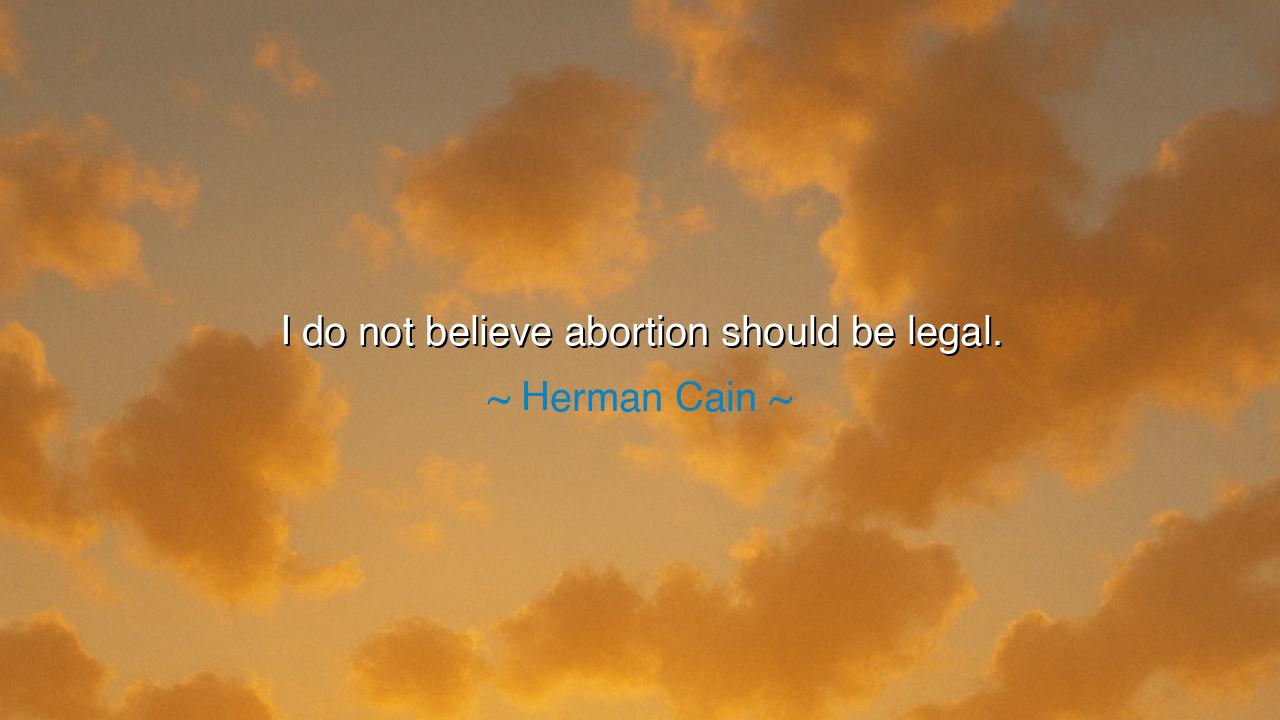
I do not believe abortion should be legal.






When Herman Cain declared, “I do not believe abortion should be legal,” he was not merely voicing a political opinion, but uttering a conviction that reaches into the deepest questions of life, morality, and the sacred duty of creation. These few words stand as both a moral proclamation and a cry of conscience — a belief that life, however small, however fragile, carries the spark of divine purpose. Cain’s statement is not a condemnation of individuals, but a call to revere that which is most innocent: the beginning of human existence. In a world that often weighs convenience above sanctity, such a declaration resounds like a bell of conscience in a storm of confusion.
From the dawn of civilization, the question of life’s origin and worth has been the axis upon which law, faith, and ethics turn. The ancients did not possess our modern instruments, yet they felt the heartbeat of creation in the womb as a holy mystery, a bond between mother and the divine. In every tradition — whether in the hymns of the Vedas, the laws of Moses, or the teachings of early philosophers — the child yet unborn was regarded as part of the human family. To destroy that potential was to tamper with the sacred rhythm of nature. Thus, Cain’s stance echoes not new ideology, but the ancient understanding that life is not a possession to be discarded, but a gift entrusted to our care.
To understand the passion behind such words, one must also see the moral anguish of modernity — a world torn between compassion for choice and reverence for life. Cain, raised in a time of struggle and faith, believed that moral law must guide civil law, that legality without morality becomes an empty shell. His declaration stands not against people, but against a system that might normalize indifference to the unborn. To him, life was not a matter of circumstance, but of principle — and principles, once surrendered, unravel the very soul of a nation.
History, too, offers moments that echo this same moral tension. Consider the story of William Wilberforce, who in the 18th century stood before the British Parliament to end the slave trade. Many told him his cause was too moral, too emotional, too impractical for the law. But Wilberforce replied that law must rise to protect the voiceless, for the purpose of justice is not comfort, but conscience. In the same way, those who oppose abortion from conviction see themselves as defenders of those who cannot speak — the silent, the unseen, the unborn. Whether one agrees or not, the moral architecture of their belief is built upon the ancient notion that the weakest among us deserve the strongest defense.
Yet Cain’s quote also reveals a deeper truth — that belief itself is a moral act. To say “I do not believe” is to take personal responsibility in an age that hides behind neutrality. He was not commanding others, but confessing his own moral position — a reminder that conscience is not meant to please the crowd. Like the prophets of old who stood before kings and said, “Thus saith the Lord,” Cain’s words bear the tone of one who answers to a higher law than man’s decree. It is a call to courage — to live by conviction even when the world mocks or misunderstands.
But the quote’s wisdom is not confined to the issue of abortion alone. It teaches a timeless principle: that law and morality must remain intertwined, for a society that separates them loses both justice and soul. A law that denies the sanctity of life, or that makes life a matter of convenience, corrodes the moral foundation upon which freedom stands. When nations begin to decide which lives are worth protecting, they tread a path toward darkness, where compassion becomes selective and conscience grows dull.
Let this reflection end not in division, but in reverence. Whether one shares Cain’s belief or not, every heart can recognize the weight of the question he raises — the question of what it means to honor life. The ancient teachers would urge us to tread carefully upon this sacred ground. Let us cultivate empathy for mothers in pain, wisdom in judgment, and above all, humility before the mystery of life itself. For no matter where one stands, it is better to wrestle with conscience than to drift in apathy. And in that struggle, we may rediscover what Cain sought to remind us of: that life, in all its forms, is holy, and the defense of the innocent is the truest measure of a people’s soul.






AAdministratorAdministrator
Welcome, honored guests. Please leave a comment, we will respond soon